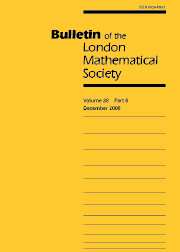No CrossRef data available.
Article contents
PERIPHERAL SPECTRA OF ORDER-PRESERVING NORMAL OPERATORS
Published online by Cambridge University Press: 01 September 1999
Abstract
Let X be a real Banach space. A set K ⊆ X is called a total cone if it is closed under addition and non-negative scalar multiplication, does not contain both x and −x for any non-zero x∈X, and is such that K−K := {x − y : x, y ∈ K} is dense in X. Suppose that T is a bounded linear operator on X which leaves a closed total cone K invariant. We denote by σ(T) and r(T) the spectrum and spectral radius of T.
Krein and Rutman [5] showed that if T is compact, r(T) > 0 and K is normal (that is, inf{∥x+y∥ : x, y ∈ K, ∥x∥ = ∥y∥ = 1} > 0), then r(T) is an eigenvalue of T with an eigenvector in K. This result was later extended by Nussbaum [6] to any bounded operator T such that re(T) < r(T), where re(T) denotes the essential spectral radius of T, without the hypothesis of normality. The more general question of whether r(T) ∈ σ(T) for all bounded operators T was answered in the negative by Bonsall [1], who as well as giving counterexamples described a property of K called the bounded decomposition property, which is sufficient to guarantee that r(T) ∈ σ(T).
More recently, Toland [8] showed that if X is a separable Hilbert space and T is self-adjoint, then r(T) ∈ σ(T), without any extra hypotheses on K. In this paper we extend Toland's results to normal operators on Hilbert spaces, removing in passing the separability hypothesis.
- Type
- NOTES AND PAPERS
- Information
- Copyright
- © The London Mathematical Society 1999


